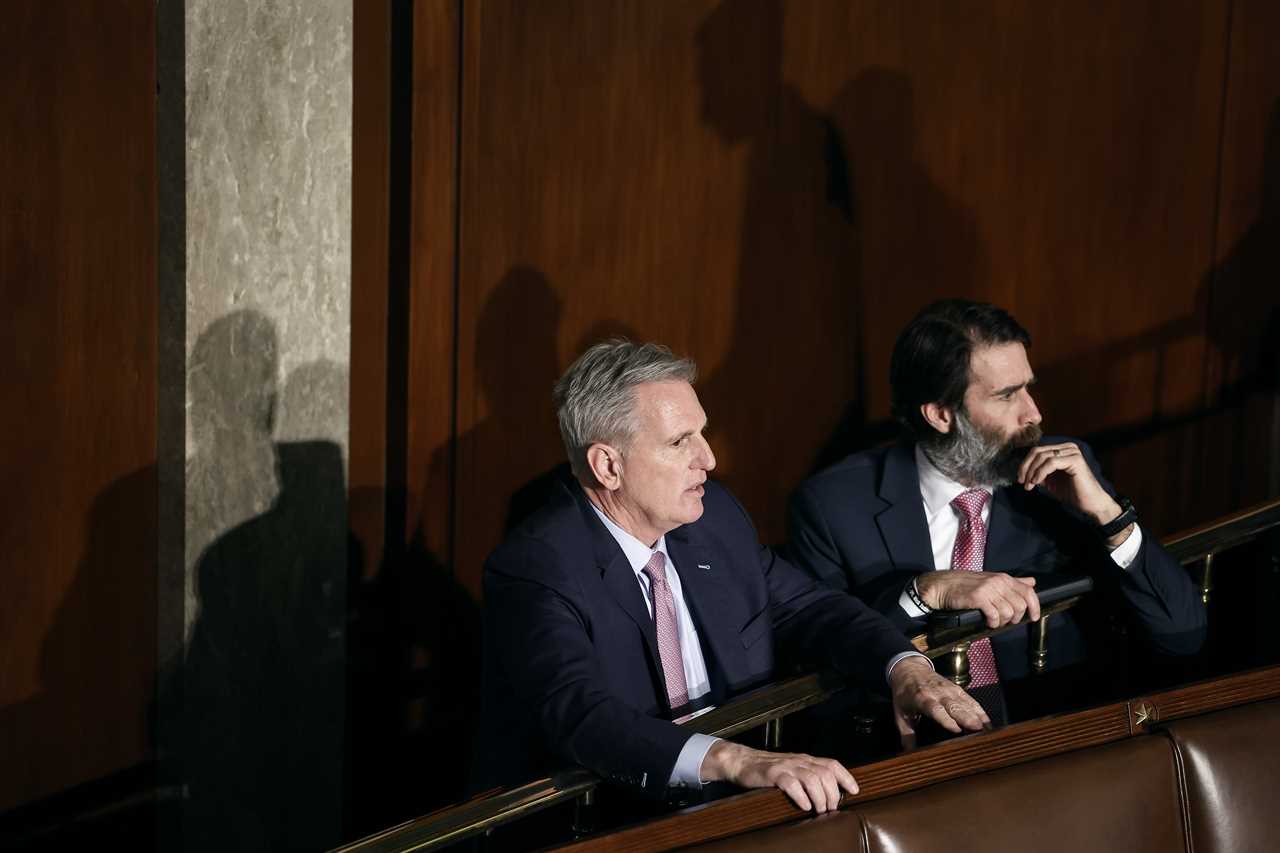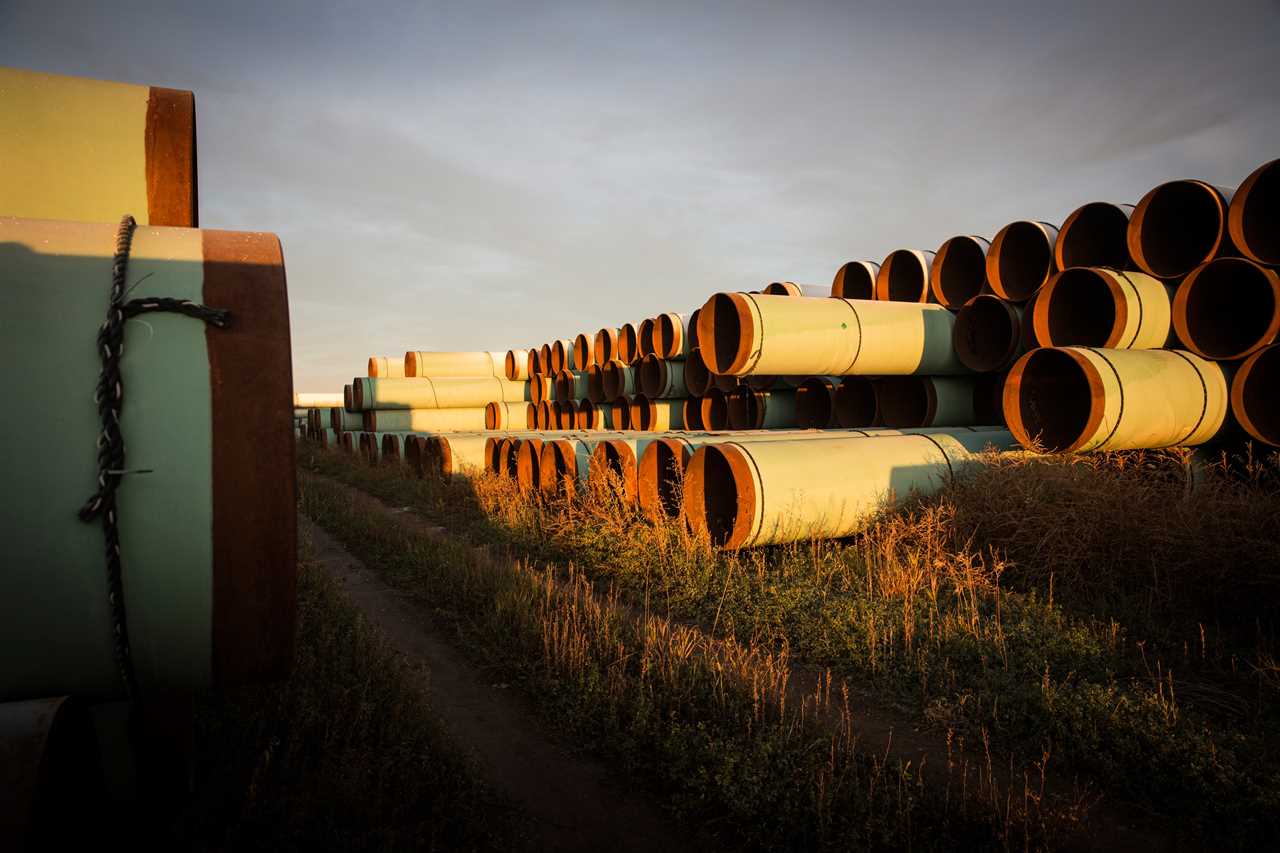
Nearly three months after they swept in, House Republicans are almost ready to take the first big piece of their agenda to the floor. And it's not exactly a shoo-in.
Speaker Kevin McCarthy and his team have spent weeks assembling a marquee energy package designed to unite their fractious conference and accomplish one of their biggest pledges from last year’s gas-price-obsessed midterms. The energy package — which they aim to pass the last week of March — is set to include some of the party’s most popular pitches over the past decade, from boosting fossil-fuel production on federal lands to disapproving of President Joe Biden’s block on the Keystone XL pipeline to easing environmental reviews of energy and mining projects.
But that wide-ranging appeal across the GOP's ideological spectrum also creates more pressure points for McCarthy to manage. He'll have zero room for error and face a herculean task in preventing last-minute changes on the floor that could risk unraveling the entire plan.
“Everybody will have a little different perspective. But when you want to attack inflation in this country, it starts with an all-of-the-above energy policy, and I think that will be the more unifying thing,” said House Majority Whip Tom Emmer (R-Minn.).

While each of the 20 or so bills getting united for the House package has broad support in committee, senior Republicans are still deciding how exactly to maneuver on the floor. While conservatives have demanded a kind of “open season” for amendments, GOP leaders sense that could be a risky strategy for such a high-stakes bill — one that’s likely to be a key plank in their 2024 platform. They’re still undecided on whether to allow a so-called “open rule,” according to multiple lawmakers and aides.
“That’s the five-vote majority problem,” said Rep. Kelly Armstrong (R-N.D.), noting that the GOP has already seen energy issues like offshore drilling pit cause intra-party tension on the floor — most recently pitting drill-skeptical Florida Republicans against their colleagues. “If you have a delegation that has a problem, you have a bill problem.”
The big energy package has long been atop the GOP’s agenda, not all of which has gone smoothly after a dragged-out speaker’s race and slow start to legislating. While House Majority Leader Steve Scalise (R-La.) had pledged to bring up bills on the southern border, criminal justice and abortion insurance restrictions within the first two weeks of the new majority, those bills have all stalled amid resistance within the conference.
And there’s another big reason House Republicans are relishing the chance to bring this to the floor. It’s considered their opening bid on the wonky yet critical issue of energy permitting — a rare policy area that both parties believe could lead to a bipartisan deal that President Joe Biden’s willing to sign.
They know that their package's pro-fossil-fuel proposals and its targeting of Biden’s progressive climate policies are unlikely to garner bipartisan support, but GOP lawmakers hope the permitting plank in particular represents an aggressive starting point for negotiations with Senate Democrats. Perhaps their most politically vulnerable centrist, Sen. Joe Manchin (D-W.Va.), watched his permitting reform plan fall short last year even as his party controlled both the House and Senate.
“The dynamics of the last Congress, with Manchin leading it, weren’t really conducive to getting something done. And this approach of doing something that originates in the House is a better start,” said Rep. Garret Graves (R-La.), a McCarthy ally and party leader on energy issues.
Graves crafted the main permitting measure in the House GOP package, which would overhaul rules for reviews conducted under the National Environmental Policy Act — a bedrock environmental law adopted in 1970 — for energy infrastructure, be it pipelines or wind turbines.
Manchin had demanded his party attempt to pass a similar effort but failed thanks in part to Republicans who were peeved by his support for Democrats’ party-line tax, health care and climate bill.
From his perch atop the Energy Committee, Manchin is still joining with the White House to press for a congressional permitting modernization that would, they say, help companies take full advantage of the hundreds of billions of dollars in subsidies that the party-line deal devoted to expanding clean energy.
“I wouldn't expect their [Republicans’] first bill to be something the Democrats could support,” said Rep. Scott Peters (D-Calif.), a centrist who is talking to House Republicans about permitting. “It is true we have an interest, as climate action advocates, to move things along in a way I am not sure the current law accommodates.”
Most of the rest of Republicans' legislative package, though, is dead on arrival in the Senate. Instead, it serves mostly political purposes for a GOP that hammered the issue for months during the midterm campaign.
The effort follows components of a broader energy strategy that McCarthy released last summer, calling for measures to stimulate oil and gas production, ease permitting regulations and reduce reliance on China for critical materials used in green energy technologies.
McCarthy’s strategy stemmed from an "energy, climate, and conservation task force" he created ahead of the midterms, chaired by Graves, that incorporated legislative ideas from across the conference. That work drew support from leaders of key committees, including Reps. Cathy McMorris Rodgers (R-Wash.) of Energy & Commerce, Bruce Westerman (R-Ark.) of Natural Resources, Frank Lucas (R-Okla.) of Science, and Sam Graves (R-Mo.) of Transportation and Infrastructure.
“It’s energy security, it’s domestic production, and it’s inflation,” Westerman said. “It’s all of the above energy.”
The GOP effort, notably, started off at least partly with climate change in mind, as McCarthy recognized the political liability that his party faces on an issue which animates young voters on both sides of the aisle.
But in the aftermath of Russia’s invasion of Ukraine, which spiked oil and natural gas prices, most Republicans are downplaying elements of their forthcoming package that could potentially boost clean energy and help address climate change. Instead, Republicans are arguing that Democratic climate policies have stoked inflation by slowing oil and gas production — even though output of both has climbed under Biden.
“Their agenda is just all in for the polluters and Big Oil,” said Rep. Kathy Castor (D-Fla.), who led the Select Climate Crisis Committee last Congress alongside Graves (Republicans have since disbanded it). “There is such dissonance there. It's confusing, to say the least.”
Republicans counter that their agenda — promoting production and export of all forms of energy, including renewables and other carbon-free sources — makes more sense since Russia’s continental aggression underscored the importance of maintaining ample supplies of oil and gas even as the world transitions off fossil fuels.
“It's a really good time to merge energy and climate policy with rational approaches to being cleaner,” said Rep. John Curtis (R-Utah), who chairs the nearly 80-member Conservative Climate Caucus. “Before, maybe the whole conversation was on being clean. Now, it's about being affordable, reliable, safe, and clean. That's a good nexus for a lot of us.”
----------------------------------------
By: Sarah Ferris and Josh Siegel
Title: House GOP readies its first big agenda push: A massive energy bill
Sourced From: www.politico.com/news/2023/03/06/mccarthy-energy-bill-climate-house-republicans-00085415
Published Date: Mon, 06 Mar 2023 04:30:00 EST






